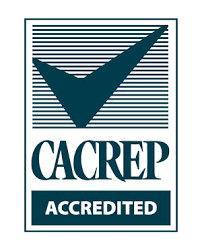
Central to Making an Impact.
Central’s Clinical Professional Counseling program prepares a diverse population of students to enter the professional counseling field as multiculturally competent practitioners who utilize systemic clinical counseling and ethical practices in alignment with the eight common core professional counseling standards of The Council for Accreditation of Counseling and Related Educational Programs (CACREP) and the nine content areas established by the National Board of Certified Counselors (NBCC). In line with Central’s core values, our program commits to embrace and strengthen Diversity and Inclusion, providing an enriching and equitable learning environment where every individual is valued, and promoting diversity of people and ideas.
Within these settings, clinicians will assist individuals experiencing emotional, mental, social, and physical challenges and disabilities. Students are taught theories and techniques of practice in individual, group, and family counseling modalities, as well as those that promote recovery, resiliency, and rehabilitation. A mindfulness-informed theoretical orientation is also integrated within the program’s coursework.
The curriculum is designed to qualify clinical professional counseling students with conferred degrees for entry-level work in a variety of mental health, rehabilitation, and addiction treatment agencies.
Program Features
- Matriculated students begin coursework each fall semester
- 60- to 63-credit program
- Attend full- or part-time
- Courses offered in evening hours for working adults
- Clinical counseling field experiences
- Access to state-of-the-art clinical counseling laboratory
- Financial aid is available
- No GMAT/GRE required
Counselor Education Program Objectives
Upon successful completion of the Master of Science degree in Counselor Education with a Specialization in Clinical Professional Counseling, students will have the foundational knowledge and skills that allows them to achieve the following counselor education program objectives, (which are aligned with the identified 2024 CACREP’s Foundational Counseling Curriculum standards for entry-level programs):
- Demonstrate core knowledge appropriate to the counseling profession (2024 CACREP Standard 3.A.1.).
- Demonstrate competencies and application of culturally sustaining approaches and strategies across all counseling service modalities. (2024 CACREP Standards 3.B.2., 3.B.9., 3.D.7., 3.B.4., 3.E.7., 3.F.8., 3.G.5., and 3.G.7.).
- Demonstrate advocacy and leadership skills (2024 CACREP Standards 3.A.4., 3.A.5., 3.B.1., 3.B.10., and 3.H.8.).
- Demonstrate appropriate knowledge and skills of counseling techniques and interventions (2024 CACREP Standards 3.E.1.-3.E.19., 3.E.21., 3.G.7., 3.H.2., and 3.H.7.).
- Demonstrate knowledge and skills to address client trauma (2024 CACREP Standards 3.B.4., 3.C.13., 3.D.2, 3.E.20., and 3.G.14.).
- Demonstrate application of knowledge of current ethical and legal codes (2024 CACREP Standards 3.A.8. and 3.A.10.).
- Demonstrate the ability to collaborate with other professionals (2024 CACREP Standards 3.A.3. and 3.E.12.).
- Demonstrate dispositions appropriate to the profession (2024 CACREP Standards 3.A.11. and 3.E.8.).
- Demonstrate excellent communication skills (2024 CACREP Standards 3.E.8. and 3.E.10.).
Program Options
Students will have the foundational knowledge and skills allowing them to achieve the following objectives, which are aligned with the identified 2024 CACREP Standards for Entry-Level Specialized Practice Areas for Clinical Mental Health Counseling:
Demonstrate understanding of the etiology, nomenclature, diagnosis, treatment, referral, and prevention of mental, behavioral, and neurodevelopmental disorders (2024 CACREP Standard 5.C.1.)
Demonstrate understanding of mental health service delivery modalities and networks within the continuum of care, such as primary care, outpatient, partial treatment, inpatient, integrated behavioral healthcare, and aftercare (2024 CACREP Standard 5.C.2.)
Demonstrate understanding of how to facilitate intake interviews, mental status evaluations, biopsychosocial histories, mental health histories, and psychological assessments for treatment planning and caseload management (2024 CACREP Standard 5.C.4.)
Demonstrate understanding of the techniques and interventions for prevention and treatment of a broad range of mental health issues (2024 CACREP Standard 5.C.5.)
Students will have the foundational knowledge and skills allowing them to achieve the following objectives, which are aligned with the identified 2024 CACREP Standards for Entry-Level Specialized Practice Areas for Clinical Rehabilitation Counseling:
Demonstrate understanding of the effects of the onset, progression, and expected duration of disability on clients’ holistic functioning (2024 CACREP Standard 5.D.1.)
Demonstrate the ability to conduct Transferable skills, functional assessments, and work-related supports for achieving and maintaining meaningful employment for people with disabilities (2024 CACREP Standard 5.D.6.)
Demonstrate understanding of environmental, attitudinal, and individual barriers for people with disabilities (2024 CACREP Standard 5.D.2.)
Demonstrate the ability to conduct intake interview, mental status evaluation, biopsychosocial history, mental health history, and psychological assessment for treatment planning and caseload management for people with disabilities (2024 CACREP Standard 5.D.8.)
Demonstrate understanding of strategies to advocate for people with disabilities related to accessibility, accommodations, and disability law adherence (2024 CACREP Standard 5.D.10.)
Students will have the foundational knowledge and skills allowing them to achieve the following objectives, which are aligned with the identified 2024 CACREP Standards for Entry-Level Specialized Practice Areas for Addiction Counseling:
Demonstrate understanding of the neurological, behavioral, psychological, physical, and social effects of psychoactive substances and addictive disorders on the user and significant others (2024 CACREP Standard 5.A.1.)
Demonstrate understanding of strategies for enhancing client motivation to change, managing cravings, and preventing relapse (2024 CACREP Standard 5.A.4.)
Demonstrate the ability to evaluate and identify individualized strategies and treatment modalities relative to substance use disorder severity, stages of change, or recovery (2024 CACREP Standard 5.A.6.)
Demonstrate understanding of substance use recovery service delivery modalities and networks within the continuum of care, such as primary care, outpatient, partial treatment, inpatient, integrated behavioral healthcare, and aftercare (2024 CACREP Standard 5.A.8.)
Demonstrate understanding of recovery support tools and systems, to include vocation, family, social networks, and community systems in the addiction treatment and recovery process (2024 CACREP Standard 5.A.9.)
--TRACK ON HOLD UNTIL FURTHER NOTICE--
Focus on the mental, emotional, and physical problems faced by aging individuals including issues that might occur as a person begins nearing the end of their life. Gain the tools to meet the needs of an aging population.




